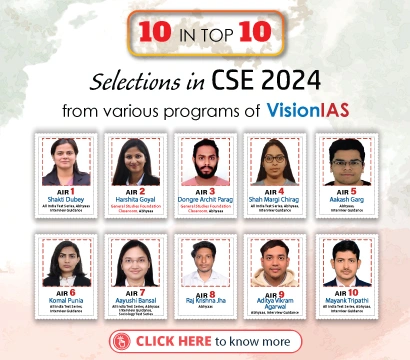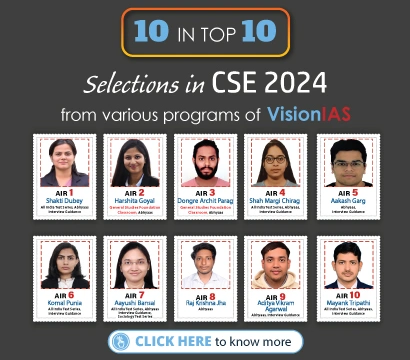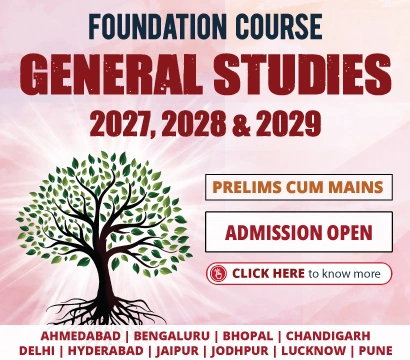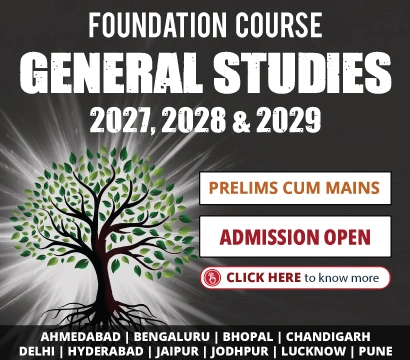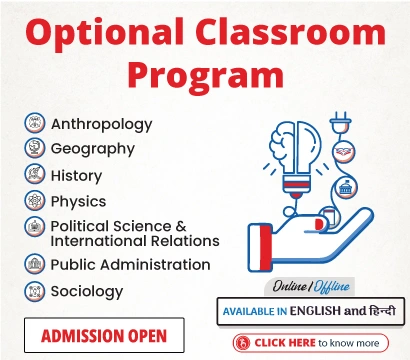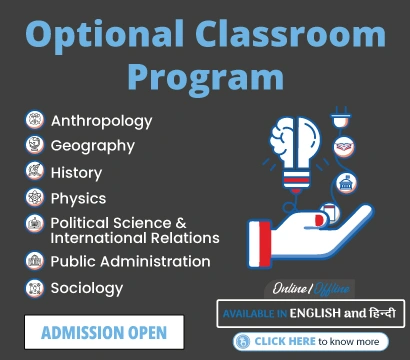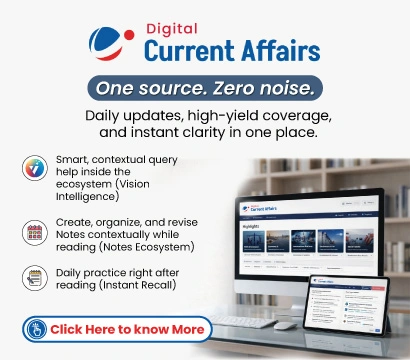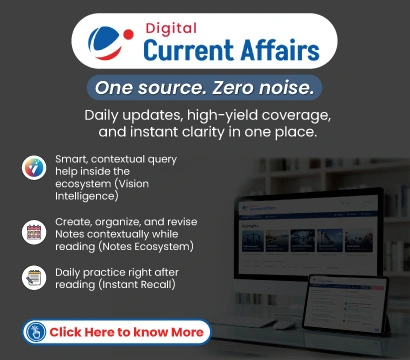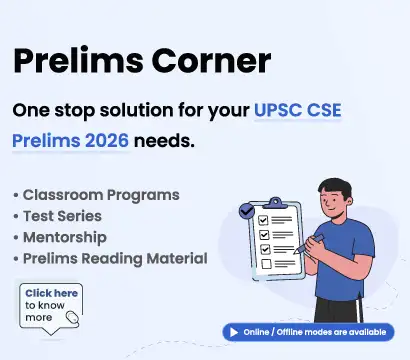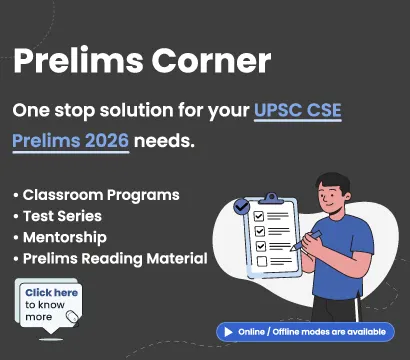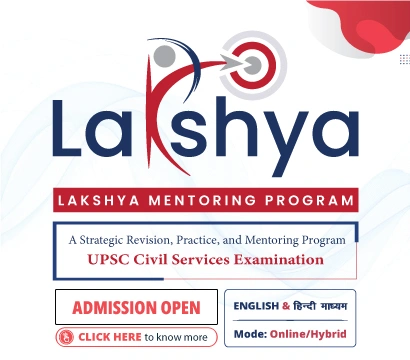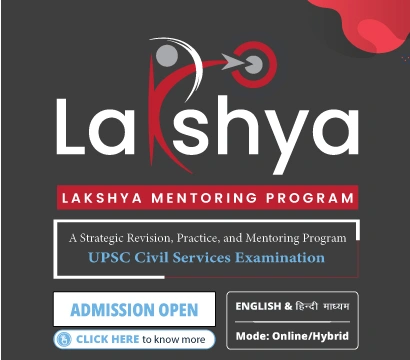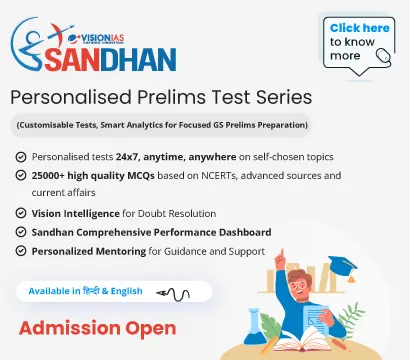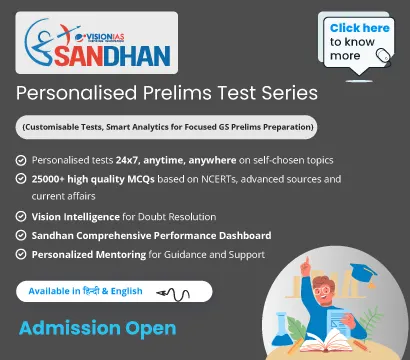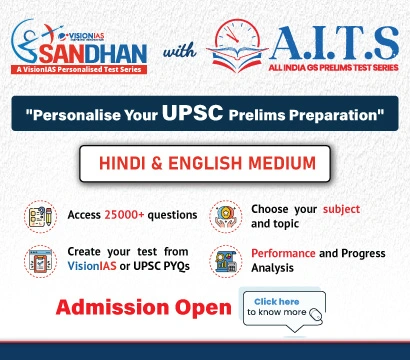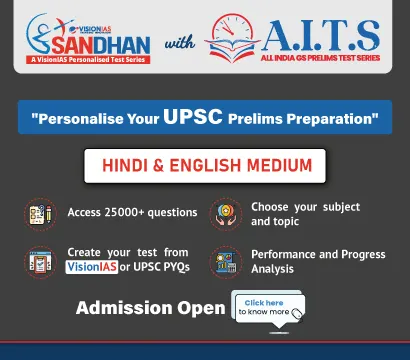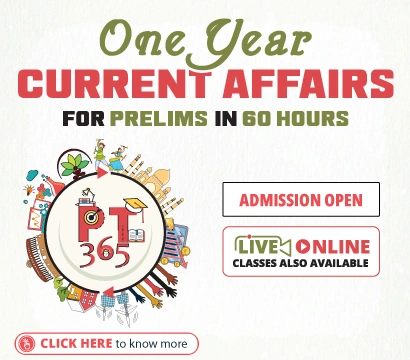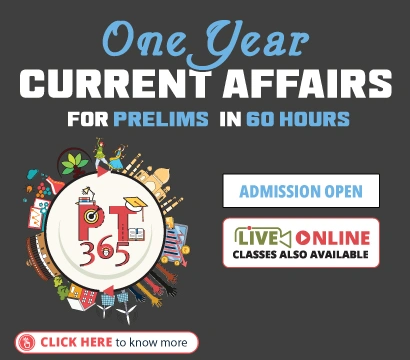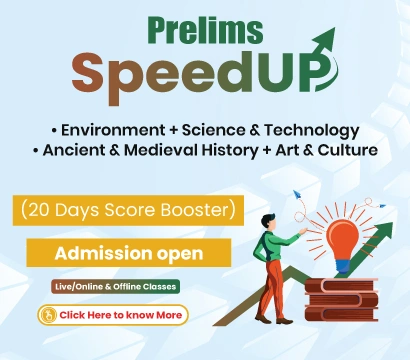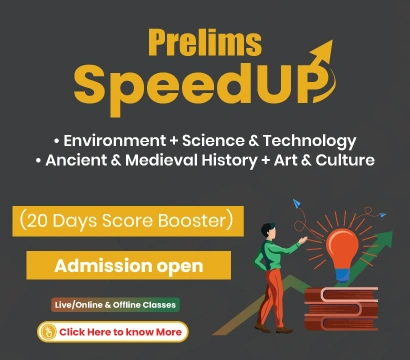Ethics
Insights from Toppers’ Copies: Ethics Answer Writing by Medha Anand, AIR-13, UPSC 2023
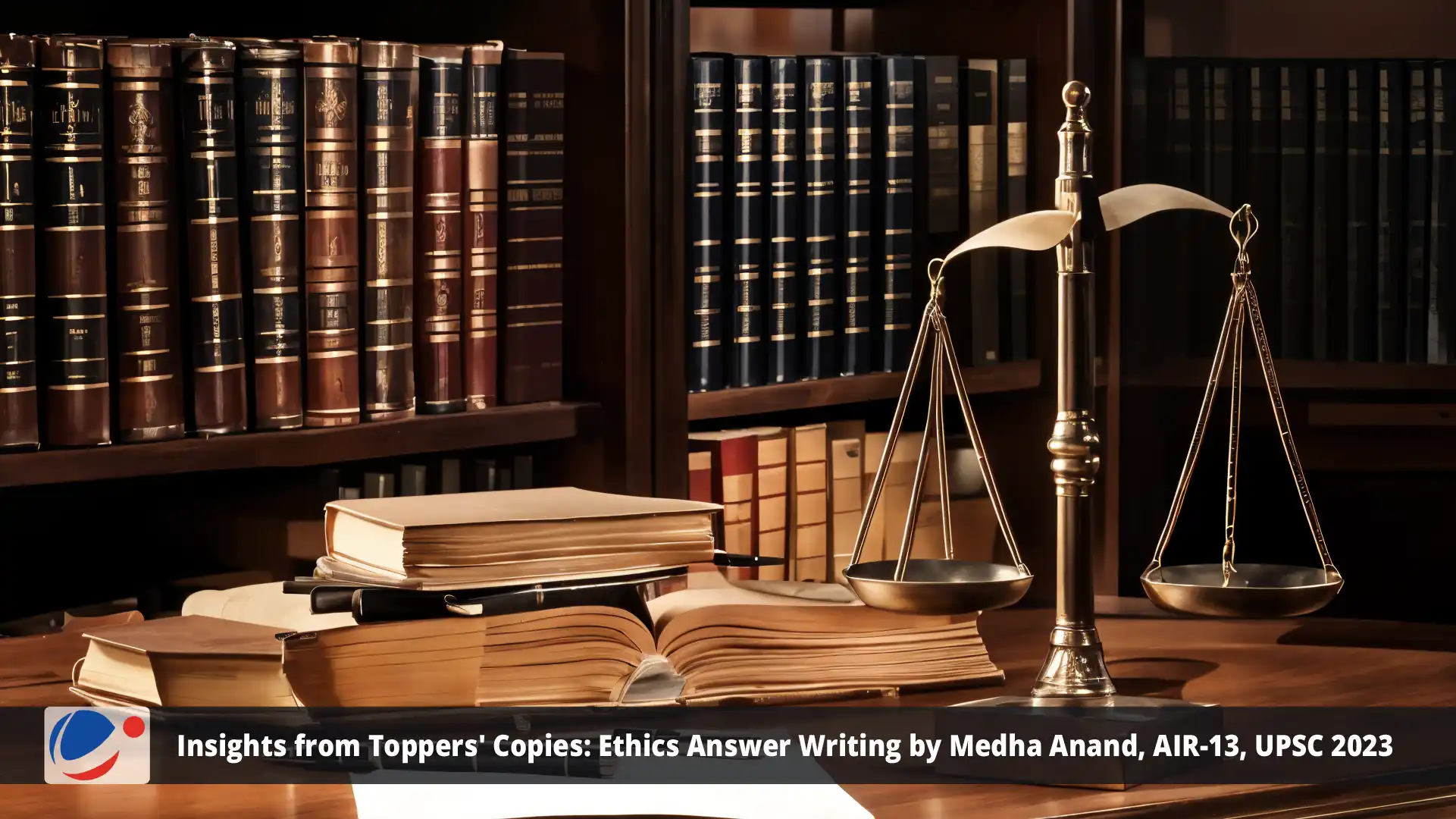
The Ethics paper (GS Paper 4) in the UPSC Civil Services Mains Examination is unique in testing aspirants’ ethical reasoning, conceptual clarity, and ability to handle real-world dilemmas. Scoring high in this paper demands a blend of clarity, logical flow, and solutions-driven answers.
Medha Anand, AIR-13 in UPSC 2023, exemplifies how structured and thoughtful answer writing can set aspirants apart. Her answers reflect a combination of depth, clarity, and coherence, earning her one of the high scores (140 Marks) in GS Paper 4.
Let us explore the key insights from Medha Anand’s Ethics answers to help aspirants refine their own approach and excel in this paper.
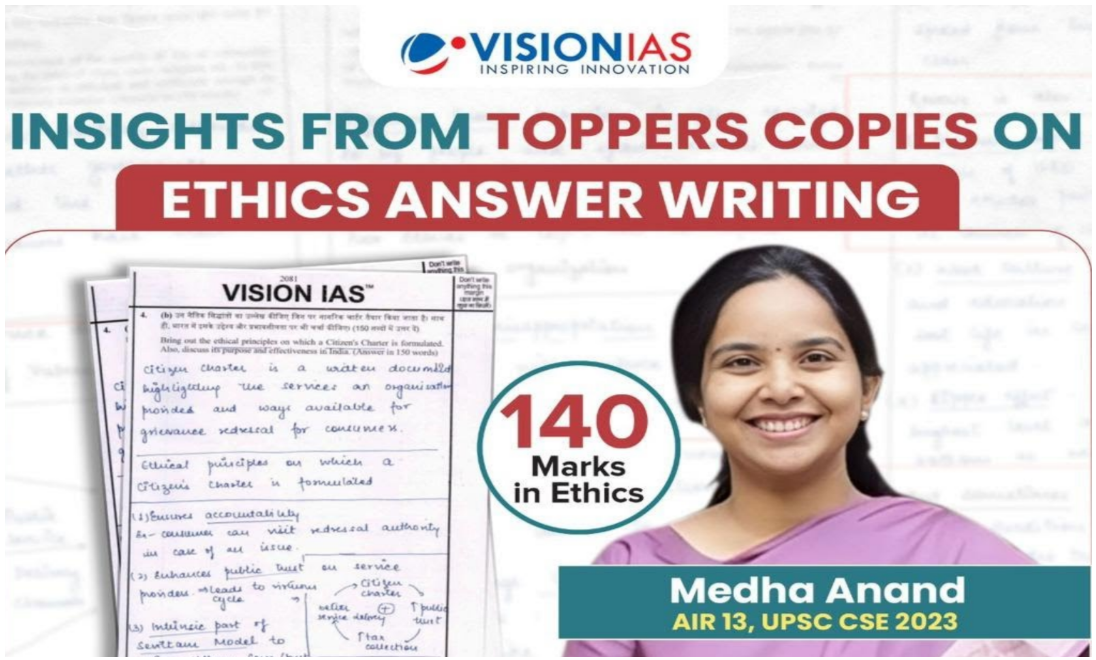
Download High Scorer Ethics Toppers Copies
Useful Insights from Medha Anand’s Ethics Answer Scripts
1. Coherent and Comprehensive Answers
Medha Anand’s Ethics answers are a stellar example of coherence and comprehensive coverage. She ensures that her responses are logically organized, addressing all aspects of the question while maintaining a flow that seamlessly connects ideas. This clarity enables her to explore the topic thoroughly without leaving any dimension untouched.
For instance, in a question on Citizen’s Charter and its effectiveness, Medha systematically explains the ethical principles behind it, such as accountability, enhancing public trust, and aligning with the Seva Param Dharma model for service delivery. She then proceeds to discuss the purpose and the challenges, including lack of awareness, feedback issues, and updates. Her well-structured response addresses both the formulation principles and real-world effectiveness, presenting a holistic answer.
A coherent and structured approach ensures that answers are both multi-dimensional and easy to follow. By logically organizing thoughts and covering all aspects of the question, aspirants can create impactful answers.
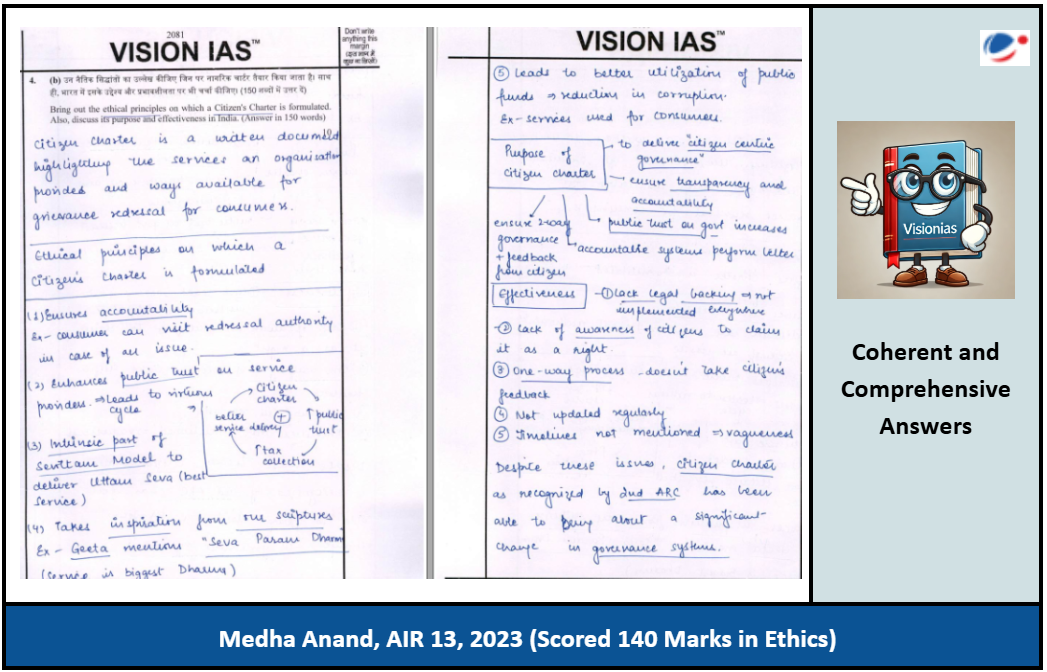
2. Focus on Demonstrating Conceptual Clarity
The next quality that stands out in Medha Anand’s Ethics answers is her ability to explain the underlying concepts right at the beginning of her answers. This method immediately demonstrates her conceptual clarity, providing a solid foundation for the rest of her answer and leaving a positive impression on the evaluator. By addressing the key concepts upfront, she ensures that the answer remains anchored to the core demand of the question.
For example, in a question on corporate governance and the integration of ESG (Environmental, Social, and Governance) principles, Medha starts by clearly defining the concept of corporate governance using the Cadbury Committee’s definition. She then breaks down the ESG principles into Environmental (sustainability, stewardship), Social (justice, harmony), and Governance (for all, of all, by all). By introducing these components right at the beginning, she establishes clarity and sets a structured tone for her answer.
For aspirants, explaining concepts in the initial part of an answer enhances the evaluator’s understanding of your answer and showcases your clarity of thought. This strategy ensures a focused and positive start to your answers.
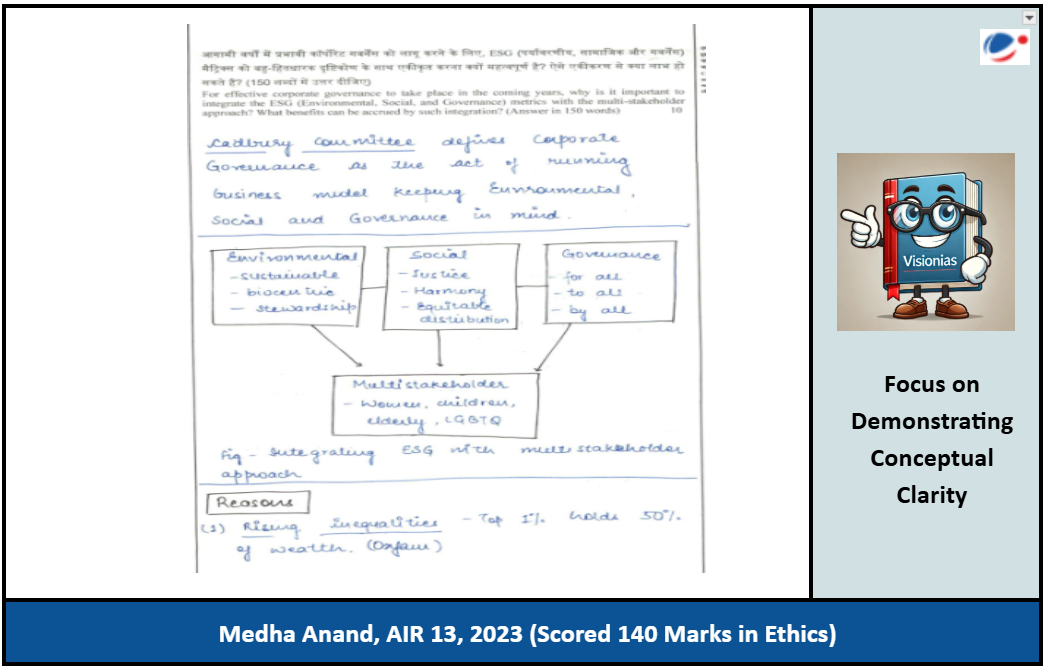
3. Contextual Statements Explained
Some Ethics questions begin with a statement that sets the context for the question. Many students tend to overlook these contextual statements and jump straight into addressing the keywords in the question. However, Medha has given good attention to those contextual statements and has tried to explain them clearly.
For instance, in a question about the quality of public service delivery and its impact on vulnerable sections, Medha clearly contextualizes the idea by breaking it into two key factors: whether governance benefits reach the last person and whether claims are equitable. She further supports this with a structured flowchart showcasing the link between policy formulation, implementation, and fund disbursal, which collectively determine the quality of life for the vulnerable population.
For aspirants, we can give more attention to the statements given in the question, to make answers more compelling.
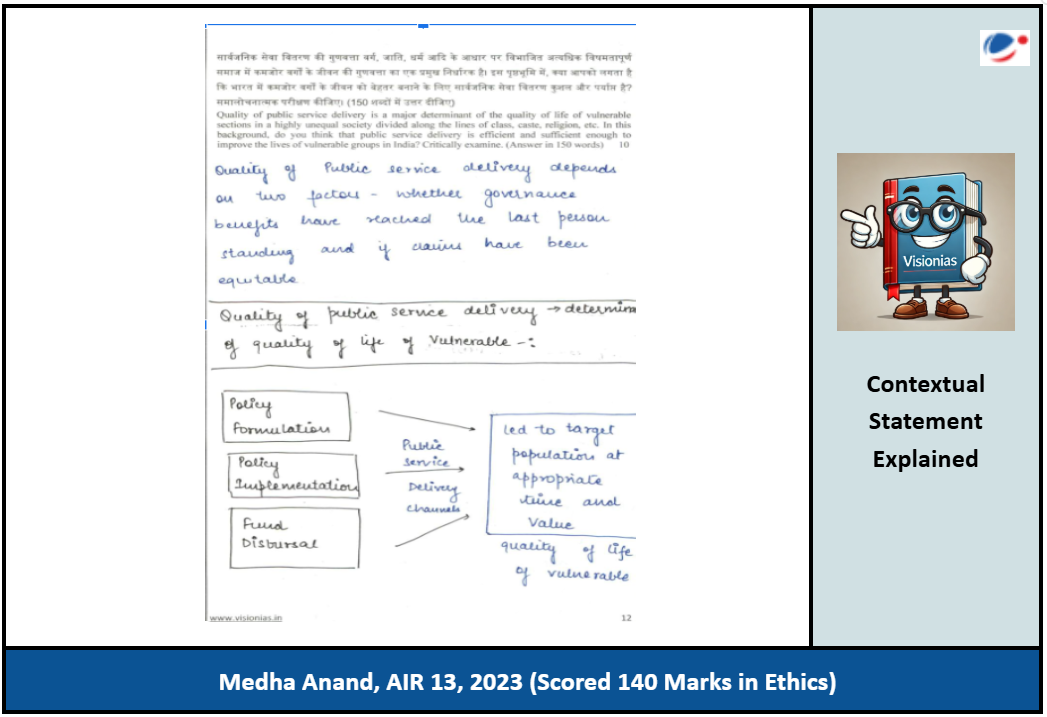
4. In Quote-Based Questions: Emphasis on Theoretical Meaning and Its Counter View
In quote-based questions, the theoretical meaning of the quotes are well explained along with their counter argument. These dimensions of the quote makes her answers comprehensive and demonstrates her ability to analyse quotes strongly from an ethical perspective.
For example, in answering to the quote, “If ethics are poor at the top, that behavior is copied down through the organization,” Medha elaborates on how poor leadership can foster unethical behavior like financial misappropriation and a culture of corruption. She balances this argument with counter-examples like the positive leadership of ISRO’s K. Sivan, which inspired mutual respect and positivity among staff during Chandrayaan’s launch. Additionally, she highlights the “trickle effect” of ethical practices at the top, deterring unethical behavior at lower levels.
Accordingly students can explain the meaning of the quote and its counter view. This adds balance and strengthens the credibility of our analysis.
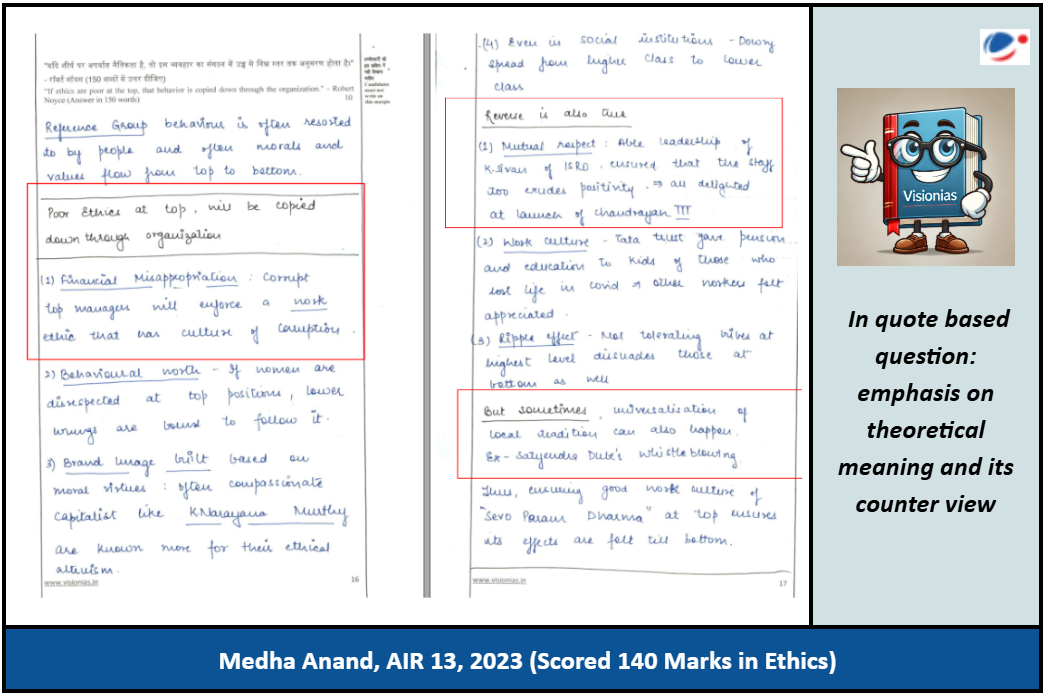
5. Emphasis on Way Forward (Solution) in Issue-Based Questions
While concluding the answer, in many questions Mesha has emphasised heavily on possible way forward in order to lend her arguments contemporary relevance. This approach makes the answers feel timely and grounded in real-world understanding.
For instance, in answering a question on Citizen’s Charter, Medha first explains the key challenges like lack of legal backing, irregular updates, and bureaucratic apathy. She then outlines clear steps to address these problems under the “Way Forward” section such as promoting the Sevottam Model, ensuring regular updates, and encouraging citizen participation for better monitoring.
For us, it’s a reminder in issue based questions, concluding our answers with positive and constructive notes can make answers more agreeable and effective.
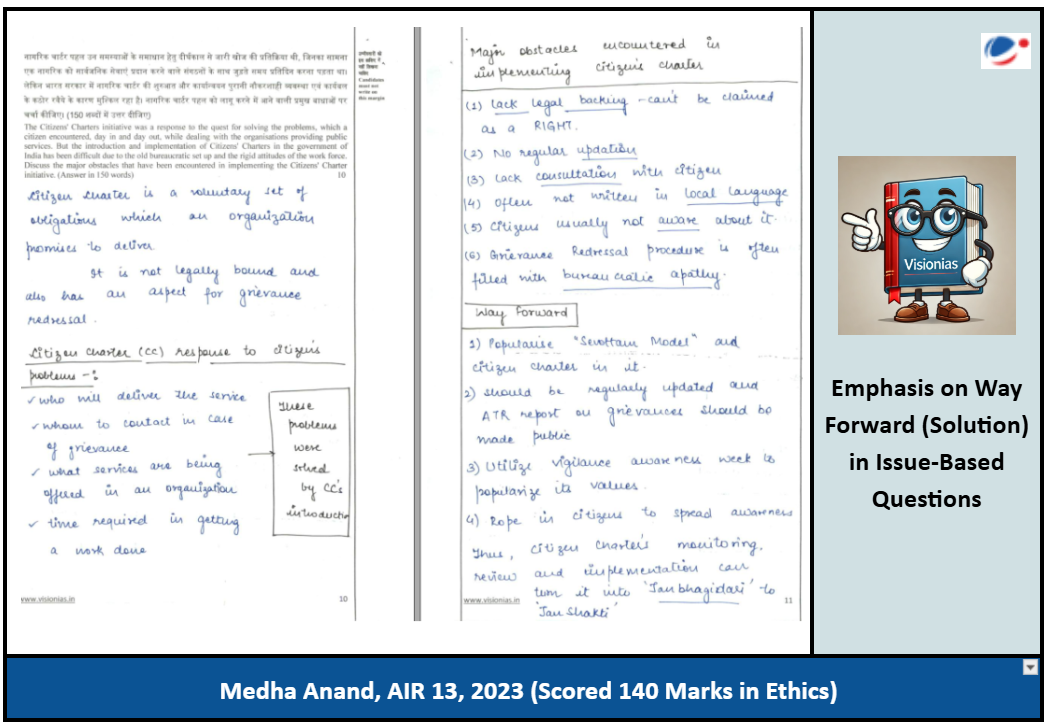
6. Proper Use of Illustrations
Another highlight of her answer writing style is generous use of illustrations to put one’s point across effortlessly. However, she has taken care that illustrations are to the point and relevant to the argument explained.
For instance, in answer to a question on Citizens’ Charter and its ethical principles, Medha incorporates a neat illustration of virtuous cycle and in another question on corporate Governance uses a schematic of ESG’s multistakeholder approach.
For aspirants, this shows the utility of using visual tools for making answers uncomplicated and easy to understand.
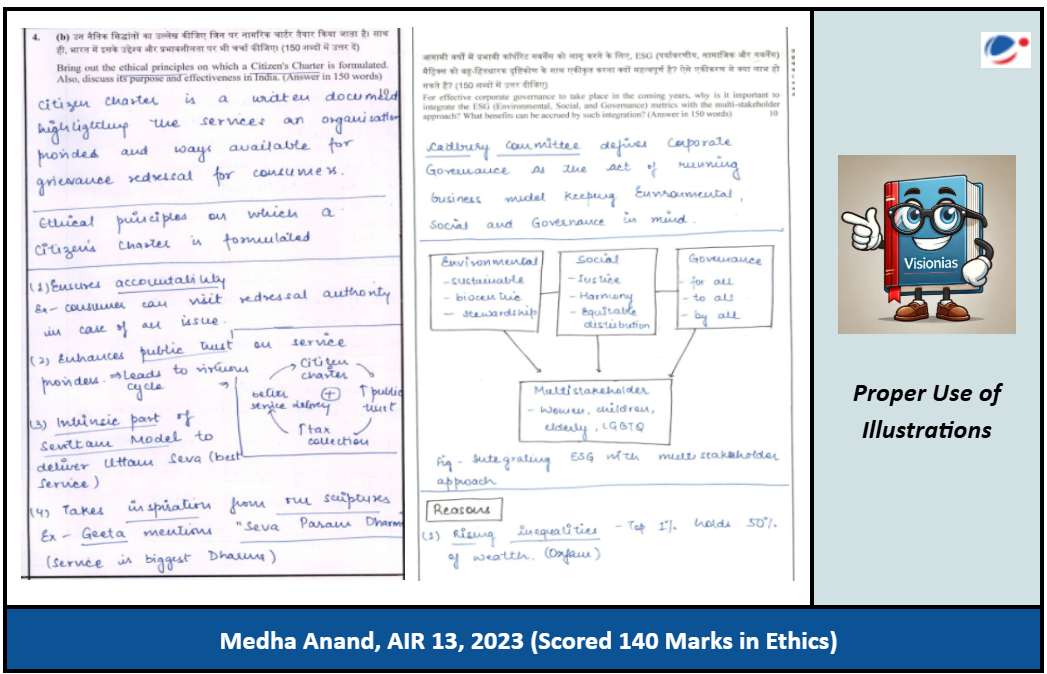
7. Contextual Introduction in Case Studies with Strong Focus on Reasoning
Medha Anand’s approach to case studies is marked by a thoughtful and contextual introduction that highlights the core ethical dimensions of the issue. By laying out the context at the start, she ensures a logical flow in her answer and a well-reasoned course of action.
For instance, in a case study on balancing environmental protection and developmental needs, Medha begins with a clear introduction explaining the conflict between industrial development and environmental sustainability. She identifies the stakeholders and highlights the need to prioritize ethical governance. Her reasoning is structured into sections like ethical dilemmas, stakeholder responsibilities, and actionable measures, ensuring clarity in her solution.
This method of writing case studies can be quite useful. Introduction gives a framework that helps guide our answer and makes our reasoning more transparent and clear.
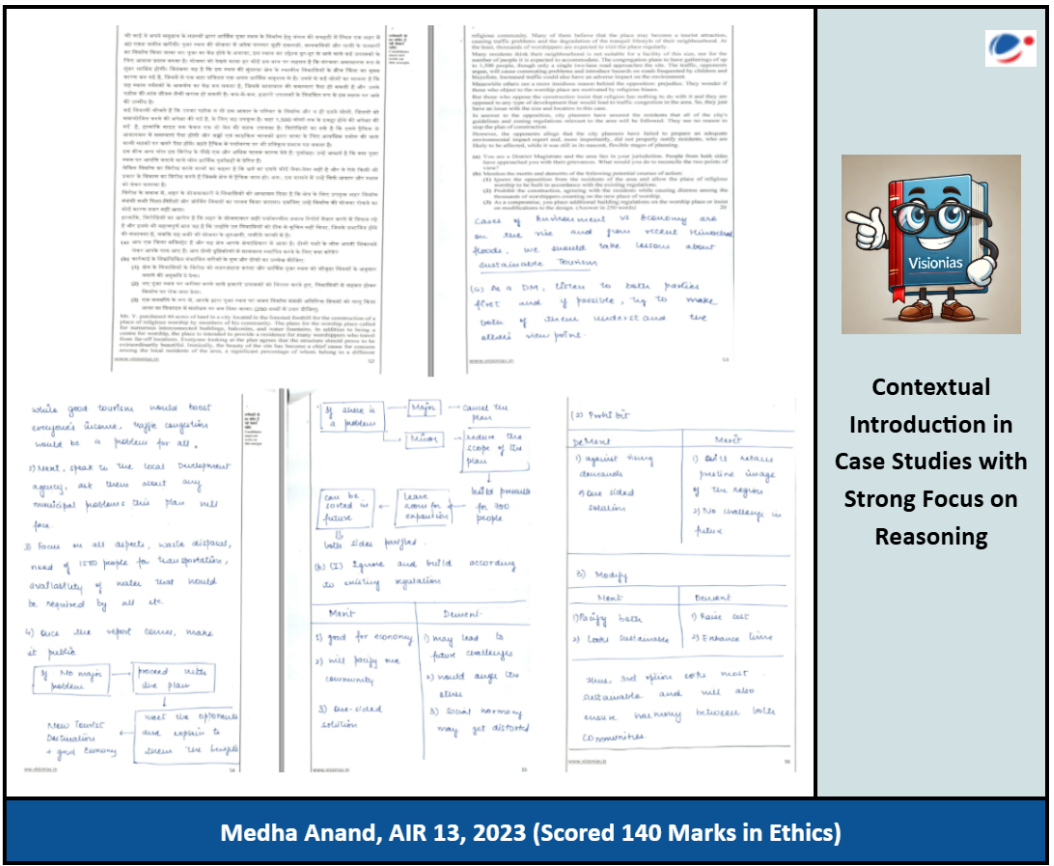
Watch: Insights from Toppers’ Copies on Ethics Answer Writing
Transforming Insights into Your Strategy
Medha Anand’s ethics answer-writing demonstrates that clarity and structure can transform even complex answers into well-articulated responses. Her ability to blend conceptual understanding, balanced arguments, and precise solutions sets a clear example for aspirants aiming to shine in GS Paper 4.
However, excellence in Ethics isn’t just about writing answers—it’s about developing an ethical mindset and integrating it into your preparation. Medha’s approach teaches us that:
- Every question demands conceptual precision—start with clarity.
- Frameworks and illustrations enhance understanding—structure is key.
- Solutions matter— conclude with actionable takeaways.
Now, it’s your turn to implement these learnings!
To help you build on these insights and refine your Ethics preparation, VisionIAS has crafted programs that focus on real progress and result-oriented strategies:
- Ethics Test Series and Mentoring Program: Designed to simulate UPSC standards, the program focuses on practice, feedback, and one-to-one mentoring to improve conceptual understanding and answer-writing techniques.
Register: All India Ethics Test Series & Mentoring Program 2025
- Case Study Classes for Ethics: Master case studies with structured frameworks and practical approaches to address real-world dilemmas in the exam.
Ethics Case Studies Classes 2025
- Advanced Course for GS Mains: Enhance your conceptual clarity and analytical abilities in GS subjects with structured classes, personalised mentorship, and rigorous practice sessions that bring you closer to perfection.
Medha’s journey proves that with practice, planning, and the right guidance, you can turn your Ethics paper into a game-changer. Start today, and with consistent effort, let your answers reflect your excellence and ethical understanding.




























